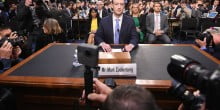This is undeniably the age of harrowing data leaks. The latest leak has affected several high-profile politicians from Germany and left the country reeling. The most embarrassing part, however, is that the leaks involve German Chancellor Angela Merkel. The leak also affected German President Frank-Walter Steinmeier.
In December, hackers leaked personal documents and data belonging to several public figures in Germany, though it was only discovered a few days ago. Those hacked included around a thousand prominent figures such as journalists, media celebrities, comedians, actors, musicians, and politicians. Justice Minister Katrina Barley said:
“The people behind this want to damage confidence in our democracy and institutions.”
Thankfully, no politically sensitive documents were part of the cache.
The Leak
Three years ago, hackers first broke into the German Parliament’s main computer network. Later, German authorities concluded that the culprits were Russian. As a result of this leak, the German government announced plans to solidify its cybersecurity. They even had their parliamentarians hold sessions on how to fortify their passwords and personal data. Nonetheless, it has happened again.
Now hackers have once again obtained personal data belonging to German politicians by unlawful means. They later posted this data online using a Twitter account that has since been suspended by Twitter authorities. This account went by the name of @_Orbit while the user claimed to be in Hamburg. The hackers apparently had access to mobile phone numbers, addresses, bills, credit card details, Facebook and Twitter passwords, work emails, personal letters, bank account details, vacation photos, copies of identity cards and political conversations between party members.
To make matters worse, the hackers put the data online on several different sites. This made it extremely difficult for authorities to take all of it down quickly.
This data leak has so much data squirrelled away to avoid take downs. It must have required many man hours of uploading.
– 70 mirrors of the download links
– 40 d/l links, each with 3-5 mirrors
– 161 mirrors of data files
Plus the tweets, blog posts, mirrors of mirror links.
— thaddeus e. grugq (@thegrugq) January 4, 2019
They posted this information online periodically in the form of daily installments for more than a month. To everyone’s embarrassment, authorities only discovered the leak late Thursday and started responding on Friday. Even then, the cyber attacks only reached the new once someone hacked the account of famous German Youtuber Simon Unge.
Who Was Affected?
German television channel RBB has reported that there could be a political motivator to the hacker. The incidents involve politicians from all political parties in the German parliament except one. The only political party that stays immune to the leaks is the far-right political party Alternative for Germany. Moreover, an NYT article confirms that the politicians whose data was leaked all had a history of criticizing the far right. Although no one is yet certain about the origin of these hacks, this selective attack raises suspicions about the hackers leaning towards far-right ideology.
Germany’s president Frank-Walter Steinmeier was among the victims. However, the attacks did not affect anyone as much as they did the German Green Party leader, Robert Habeck. Hackers leaked some of his most personal data files, including links to family photos. German authorities have confirmed that the hackers have not leaked any sensitive data belonging to Angela Merkel.
German Interior Minister Horst Seehofer has confirmed that “nothing points towards the system of the parliament or government having been compromised.”
The German Federal Office for Information Security has released an official statement:
“As a national cyber security authority, the goal of the Federal Office for Information Security (BSI) is to promote IT security in Germany. The BSI is first and foremost the central IT security service provider for the federal government in Germany… All users are called to be just as cautious online as offline, in spite of all the technical security safeguards, to minimise risks and to be able to fully utilise the numerous opportunities offered by information technology and the Internet.”
Friday’s news triggered an emergency meeting of Germany’s national cyber-defense agency, who has asked the US to step in as well. It looks like anyone hoping to undermine German politics will have quite a fight on their hands.




Share Your Thoughts